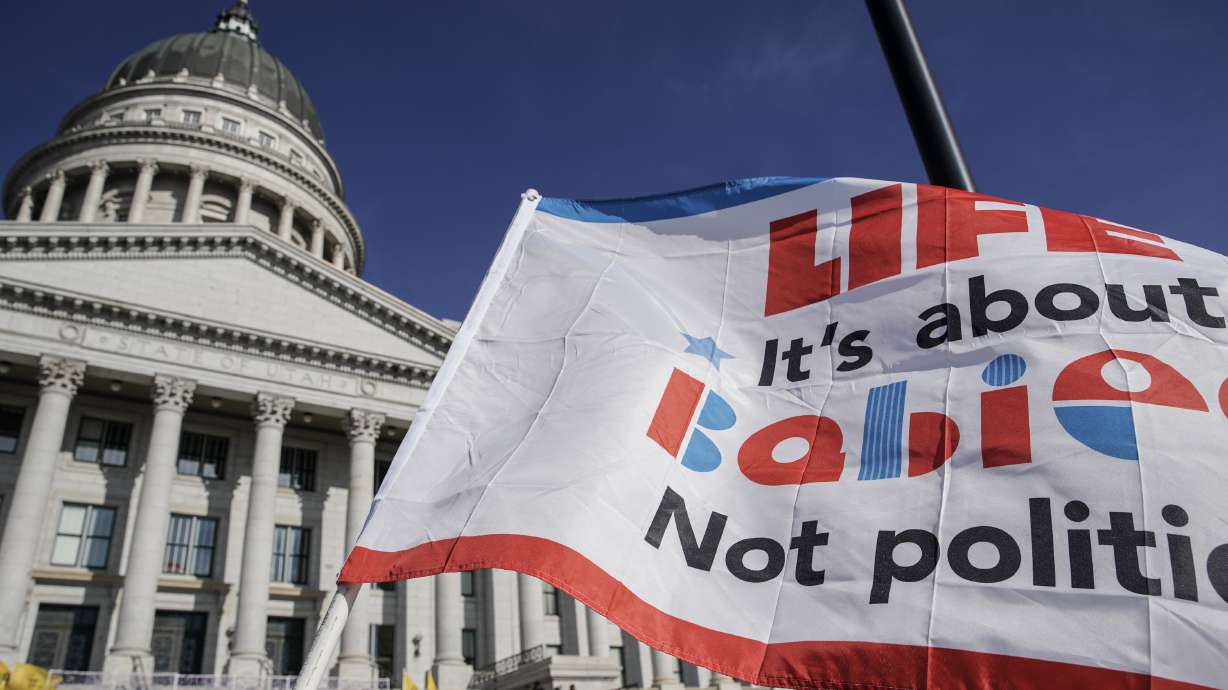Estimated read time: 5-6 minutes
This archived news story is available only for your personal, non-commercial use. Information in the story may be outdated or superseded by additional information. Reading or replaying the story in its archived form does not constitute a republication of the story.
SALT LAKE CITY — Lawmakers in Utah have long attempted to restrict abortions in the state, and a hearing at the state's highest court this week could hint at the future of the procedure.
The Utah Legislature in 2020 passed a so-called "trigger law" banning nearly all abortions, which would only go into effect if the U.S. Supreme Court overturned the landmark case Roe v. Wade, which guaranteed the right to an abortion until the fetus was considered viable.
But even after the high court overturned that right in Dobbs v. Jackson last summer, the Legislature's near-total abortion ban was blocked from going into effect while a lawsuit is pending.
Lawmakers tried to get around the hold earlier this year, by passing a law to effectively close all abortion clinics and require abortions be performed in hospitals, but that law was also paused by a judge after the Planned Parenthood Association of Utah added the new law to its pre-existing lawsuit.
On Tuesday, the Utah Supreme Court will hear arguments about whether those laws should remain on hold while the case continues to make its way through the court system.
Although a decision isn't expected immediately, the eventual court ruling will have broad impacts on access to reproductive health care in Utah.
Status of abortion law in Utah
With the trigger law and abortion clinic ban on hold, all abortions are currently legal in Utah through 18 weeks of pregnancy, thanks to a separate 2019 law.
The trigger law prohibits nearly all abortions, with few exceptions. Those include instances of rape or incest (the law requires physicians to verify that a woman reported being assaulted to police), if the mother's life is in danger, or if the fetus has a "uniformly" fatal abnormality.
Abortion rights supporters have criticized the recent clinic ban, saying it would make it difficult or impossible for some women to access the procedure, even if they meet one of the requirements for an exemption.
Allowing those laws to go into effect would create "chaos" for women's health, similar to other states where abortion access has been "decimated," said Kathryn Boyd, president and CEO of Planned Parenthood Association of Utah.
"The last year has provided a very clear picture of how abortion bans compound existing hurdles for accessing care by pregnant people," she told reporters Thursday. "People are forced to travel to receive this essential health care that should be available to them in their communities. ... Utah's abortion ban prioritizes political ideology over patients' health and lives. It is extreme by any measure."
She added that those barriers disproportionately impact people of color, low-income individuals, people living in rural areas and the LGBTQ community.
A spokesman for the Utah Attorney General's Office — which is representing the state — did not respond to a request for comment.
Rep. Karianne Lisonbee, R-Clearfield, who sponsored the clinic ban, said in February that the state has a "long-standing tradition ... of protecting the unborn by outlawing abortion" — a tradition that is furthered by the pair of bills.
"We have compassionate exemptions, and we have compassionate law and services for women who find themselves in a situation, and we as a state ought to support them in making the decision that they need to make. That's what this bill does, in a compassionate and thoughtful way."
"I think we've got a great balance here that will really try and protect the innocent and protect the health of the mother," Sen. Dan McCay, R-Riverton, said in March while presenting the clinic ban on the Senate floor.
McCay was the chief sponsor of the 2020 abortion law.
What will the Utah Supreme Court consider?
On top of the abortion clinic ban, lawmakers also passed a resolution to retroactively change court rules and raise the bar for judges to issue preliminary injunctions — like the one that is currently pausing the trigger law — during the Legislature's 2023 general session. Although the sponsors didn't explicitly cite the pause of the trigger law, HJR2 was widely seen as an attempt to allow the law to go into effect.
In light of that change, the Utah Supreme Court canceled oral arguments in the case initially scheduled for May 10, instead asking both sides for additional arguments related to the passage of the resolution.
The court is now scheduled to hear those arguments Tuesday.
Even with the scope of preliminary injunctions narrowed, Planned Parenthood argues that its lawsuit still clears the bar for issuing an injunction.
Planned Parenthood has argued "not only that it has presented serious legal issues warranting further litigation, but that it is likely to prevail on each of the six claims at issue — i.e., that PPAU is entitled to injunctive relief even under the standard now required by (HJR2)," states a court filing, obtained by KSL.com.
However, the state is arguing that it has a more compelling interest to protect unborn life through the laws passed by the Legislature, and asked the court to allow the laws to go into effect.
It argues the preliminary junction is "improper," because Planned Parenthood's claims "fail as a matter of law," regardless of the standard or rules that are applied.
"Rather, the state argues that PPAU's claims fail any standard — they do not raise a serious issue because they have no chance of prevailing," the state argues.










